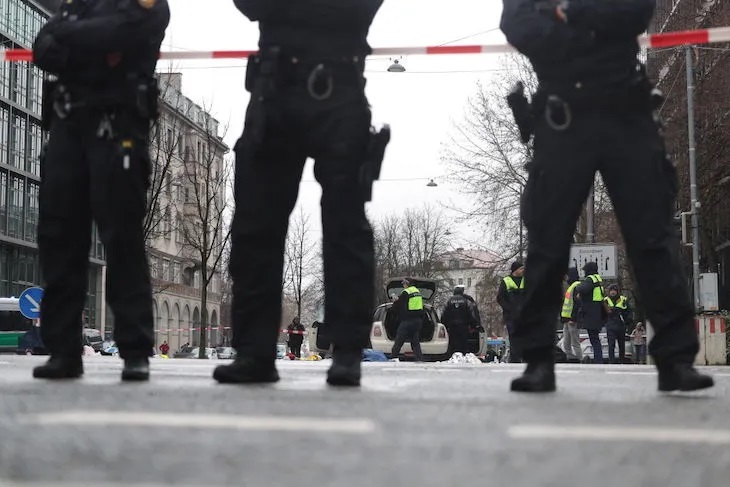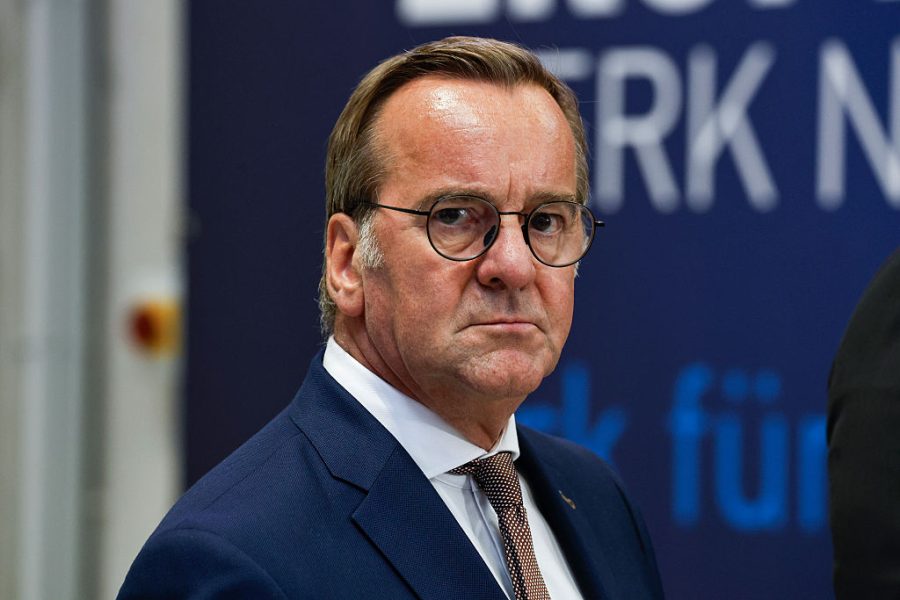Another day, another apparent attack by an asylum seeker in Germany. In Munich, a twenty-four-year-old Afghan is alleged to have driven a Mini Cooper into a trade union demonstration. At least twenty-eight people have been injured, eleven seriously, according to police.
The alleged driver of the car, Farhad N, reportedly came to Germany in 2016
Bavarian premier Markus Söder called the crash a “presumed attack.” Police say they don’t know whether there is a link to the Munich Security Conference, which is taking place in the city.
The alleged driver of the car, Farhad N, reportedly came to Germany in 2016. His asylum application was rejected but he was issued a staying order suspending his deportation. Authorities say there are “indications of an extremist background.”
The crash bears a grim resemblance to other deadly attacks which have formed the backdrop to an increasingly tense campaign for federal elections on February 23. In December, a car ramming on a Magdeburg Christmas market left five people dead; the following month, a stabbing in the Bavarian town of Aschaffenburg killed two people. An anti-Islam Saudi refugee and an Afghan asylum seeker, respectively, are suspected of having committed the attacks.
Other recent attacks include stabbings in Solingen in August, in which three people were killed, allegedly by a Syrian asylum seeker, and in Mannheim in June, when an Afghan allegedly killed a police officer.
The spate of recent attacks and a corresponding rejection of Germany’s immigration and asylum system is widely seen as being behind rising support for the far-right Alternative für Deutschland (AfD). On current polls, the party will finish second in this month’s election, an unprecedented feat for the far right in post-war Germany.
The center-right Christian Democrat Union (CDU) leader Friedrich Merz, the favorite to be the next chancellor, specifically cited recent attacks as part of his rationale for proposing a crackdown on immigration rules to parliament, including stopping asylum seekers at the border. The non-binding motion was passed because of far-right support, a first for post-war Germany. (A bill which would have made the proposals law narrowly failed to pass.)
With just ten days to go until the elections, the Munich attack is certain to further inflame an already febrile political debate. AfD leader Alice Weidel immediately called it a “terror attack,” saying it showed Germany needed a “U-turn” in migration policy. “Will this go on forever?” she asked.
Söder, who hails from the conservative Bavarian wing of the CDU, told reporters at the scene of the attack that changes in policy were urgently needed. “This is more evidence that we can’t go from attack to attack and show dismay,” he said.
A sense that the response to alleged attacks by immigrants should be a harder line on immigration is shared across the political spectrum. Figures from the governing center-left coalition responded to the Munich attack by claiming they were cracking down on immigration.
“We are the only country in Europe that is deporting people to Afghanistan despite Taliban rule and we will continue to do so,” said Interior Minister Nancy Faeser, of Chancellor Olaf Scholz’s Social Democrats.
The attacks come at a sensitive time for Germany. The country’s economy has been flatlining for two years, with economic malaise likely to deepen as President Donald Trump promises to impose broad tariffs on the EU. He has specifically cited German carmakers — already struggling with competition from China and lower-than-expected take-up of electric vehicles — as a target. Infrastructure is crumbling from decades of underinvestment; the country lags behind on adoption of new technology.
The drip-drip-drip of apparent terror attacks has only added to the looming sense of a country adrift.
Can Merz meet the moment? The likely next chancellor’s overtures to the far right on immigration do not seem to have cost him in the polls. But many Germans still wedded to the principles which underpinned decades of post-war politics — notably, no cooperation with the far right under any circumstances — view his approaches to the AfD as another of the old certainties withering away.
Still, his planned crackdown on asylum seems likely to appeal in light of the latest incident. Government figures’ claims that they are reforming the system ring hollow when it is under their watch that these attacks keep happening. Many voters think a system which allows people who have been refused asylum — and then go on to commit attacks — to remain in Germany is simply untenable.


























Leave a Reply